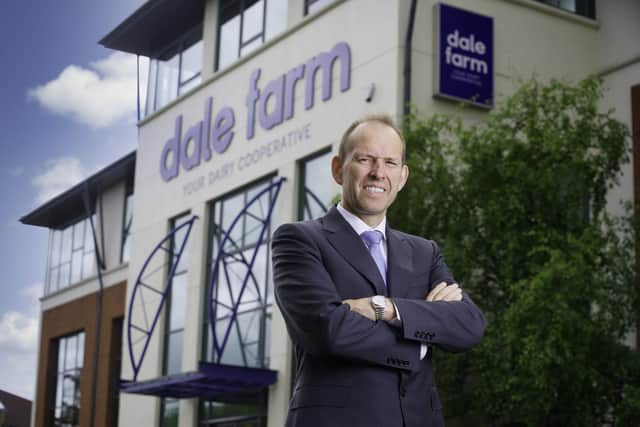World dairy markets are starting to gather momentum
and live on Freeview channel 276
He explained: “We saw the first sign of recovery in fat markets three months ago. Powders and whey followed and it looks as if cheese is about to react in the same manner.
“Dairy markets are very much supply: demand driven. Currently, world milk supplies are down year-on-year. All of this gives cause for a degree of measured optimism, looking forward.”
Advertisement
Advertisement
Dale Farm is currently paying a base price of 30.55 pence per litre (ppl) plus a 2ppl winter milk bonus for the months of October, November and December.


However, the other factor in the producer price equation relates to the bonuses that are available for enhanced milk quality.
“And this is a very positive news story,” added Nick Whelan.
“The fat and protein levels within the milk produced by Dale Farm suppliers have never been higher. Our current rolling year average for milk fat is 4.23%: the equivalent figure for protein is 3.35%.”
Advertisement
Advertisement
According to the Dale Farm CEO, these milk quality figures are increasing the average Dale Farm producer milk price by 1.51ppl.
The co-op is in the second year of transitioning its producer price structure to one that gives a greater recognition of milk components.
And, according to Nick Whelan, this process will continue.
Improvements in bactocount levels are also acting to significantly improve the quality of the milk supplied to Dale Farm, with a revised bonus structure introduced in October to reflect this back at farm level.
The Dale Farm CEO and the members of the co-op’s board are very aware of the fact that it has been a very tough few months for farmer members. Whilst forage quality and input costs are outside of our control an increase in milk price will be welcome news.
Advertisement
Advertisement
He continued: “Dale Farm’s financials have never been stronger. The business reported a very strong set of accounts for the past 12 months. And this trend will be maintained into 2024.
“Every aspect of the Dale Farm operation is now delivering profit. This was not the situation a number of years ago.”
Turn to page 5
Investment for the future is at the centre of the development plans agreed for Dale Farm. The business currently produces 60,000t of cheddar cheese annually: the intention is to push this figure up to 90,000t over time.
“Currently, half of our cheese is sold as pre packs into retail outlets across 28 countries,” said Whelan.
Advertisement
Advertisement
“The other 50% is sold to high-end food processors. Making this happen is the fact that Dale Farm produces high quality industrial curds, using a patented process.
“In addition, our whey is sold for the production of high quality infant formula. Again, this reflects very positively on the quality of the milk we receive from suppliers.”
Dale Farm supplies a range of branded milks, creams, custards and ice creams.
“Again, this end of the business is doing very well at the present time,” Whelan confirmed.
Advertisement
Advertisement
“Responding to the threat of climate change and delivering greater levels of sustainability is a challenge that faces every farmer in Northern Ireland right now.
“And Dale Farm members are no different in this regard,” stressed Nick Whelan.
“Back in September the co-op launched a sustainability programme on the back of 15 farmer meetings. We had a tremendous turnout for all these events.
“The new programme centres on three key areas: producer agreement to undertake carbon foot printing; completion of a Sustainability Survey; supply of soil sampling results and slurry/manure application levels applied so that a nutrient management plan can be produced for each farm.
Advertisement
Advertisement
“With regards to carbon foot printing, Dale Farm fully supports the development and piloting work currently being undertaken, led by the Livestock and Meat Commission.
“The Sustainability Survey was designed to learn more about the farm systems supplying into our milk pool and focused on six pillars which were: farm description, land use and nutrient management, feed management, herd management, manure management and energy use.
“To date, approximately 80% of Dale Farm suppliers have completed the initial survey, which sets the baseline for the sustainability programme.
“The next stage of our programme is engagement on soil sampling and nutrient management planning. Farmers will be receiving correspondence from our Farmer Services team in the coming days. Farmers who have already been involved with the Soil Nutrient Health Scheme (SNHS) can submit these sample results for the purposes of the project.”
Advertisement
Advertisement
However, Nick Whelan is confirming that the timetable set for the Dale Farm initiative will significantly outpace that established for SNHS.
“We can’t wait for SNHS to run its course. Commercial reality dictates that we need all our members to engage, so staff will prioritise assistance to farmers located in the regions which the SNHS has not yet reached,” he said.
Whelan recognises the need for a joined-up approach when it comes to agriculture delivering on its climate change commitments.
Nick Whelan concluded: “But the time for talking is over. We need more pace brought to bear where all these climate change mitigation and farm sustainability measures are concerned.”